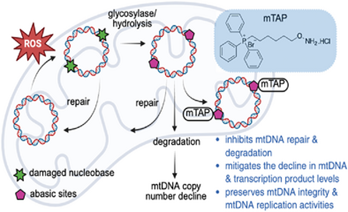Novel Mitochondria-Targeting Abasic Site-Reactive Probe (mTAP)
Tech ID: 34234 / UC Case 2025-698-0
Background
Defects in mitochondrial DNA (mtDNA) are a hallmark of numerous mitochondrial disorders and human diseases, often leading to impaired cellular energy production. While mtDNA is a critical signaling molecule, it is vulnerable to genotoxic stress, resulting in detrimental mtDNA loss. The absence of a precise chemical intervention to safeguard mtDNA levels under such stress presents a substantial opportunity for novel therapeutic and research tools.
Brief Description
Professor Linlin Zhao and their team from the University of California, Riverside have developed mTAP, a new chemical probe engineered to selectively bind to abasic sites within mitochondrial DNA without affecting nuclear DNA. Unlike non-specific agents, mTAP is equipped with a mitochondria-targeting group, ensuring its precise localization. This invention is advantageous over current technology because its mechanism of action involves forming a stable chemical bond with damaged DNA sites, thereby protecting mtDNA from enzymatic cleavage and maintaining its replication and transcriptional activities.

Fig 1: The UCR mitochondria-targeting water-soluble probe mTAP exclusively reacts with mitochondrial abasic sites, and retains mitochondrial DNA levels under genotoxic stress which are responsible for certain mitochondrial diseases.
Applications
- For the development of novel therapeutics for mitochondrial disorders and as a research tool for the study of mitochondrial DNA repair mechanisms.
- For various biotechnology applications such as a drug discovery platforms for diseases linked to mtDNA dysfunction and as a diagnostic assay for cellular genotoxic stress.
Patent Status
Patent Pending
Related Materials
Contact
- Grace Yee
- grace.yee@ucr.edu
- tel: View Phone Number.
Other Information
Keywords
Abasic site, DNA damage, DNA Repair, Mitochondrial DNA, Mitochondrial DNA repair
